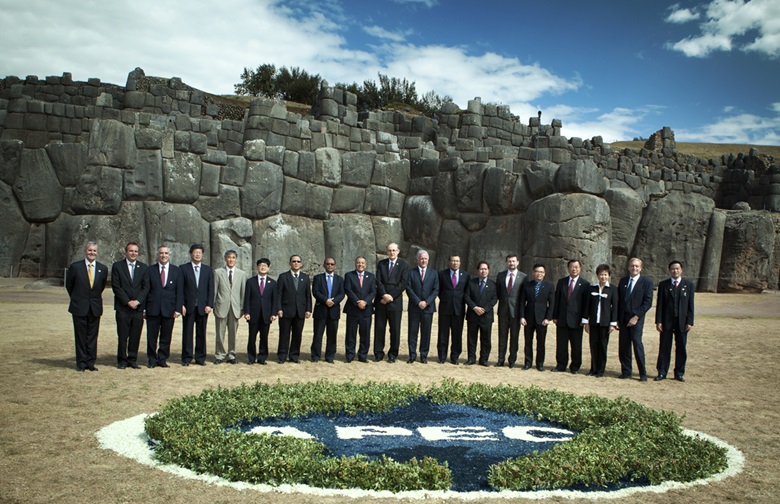2013 APEC Meeting of Ministers Responsible for Forestry

We, the ministers and senior officials attending the Second APEC Meeting of Ministers Responsible for Forestry, held in Cusco, Peru on 14–16 August 2013:
Reaffirming the forestry goals outlined in the 2007 Sydney APEC Leaders' Declaration on Climate Change, Energy Security and Clean Development, such as increasing forest cover in the region by at least 20 million hectares of all types of forests by 2020 and establishing the Asia-Pacific Network for Sustainable Forest Management and Rehabilitation (APFnet) which has a very important and active role in sustainable forest management in the APEC region;
Recalling the commitment of the 2010 Yokohama APEC Leaders’ Declaration to “enhance work on meeting the aspirational goal in the Sydney Declaration,…instruct our officials to take concrete steps toward this goal,…enhance our cooperation to address concerns with illegal logging and associated trade and promote sustainable forest management and rehabilitation.”;
Recalling also the commitment of the 2011 Honolulu APEC Leaders’ Declaration to work to implement appropriate measures to prohibit trade in illegally harvested forest products and undertake additional activities in APEC to combat illegal logging and associated trade;
Building upon the Declaration of the First APEC Meeting of Ministers Responsible for Forestry in Beijing in 2011 to contribute to mitigating the effects of climate change through sustainable forest management, conservation and carbon stock enhancement to reach the goal of increasing forest cover in the region by at least 20 million hectares by 2020;
Recognizing the establishment of the APEC Experts Group on Illegal Logging and Associated Trade (EGILAT) in 2011, and commending its work over the past two years;
Welcoming the actions developed under EGILAT to enhance the promotion of trade of legally harvested forest products while recognizing the different realities of the economies;
Recognizing the 2012 Vladivostok APEC Leaders’ Declaration with respect to the growing challenges to regional and global food security, the risks facing the world economy, and the unique role and contribution of forests to enhancing local and rural livelihoods of APEC members;
Recognizing the importance of existing forest related international organisations and other relevant regional and sub-regional mechanisms and encouraging cooperation, when appropriate, with these organisations to achieve forestry goals and sustainable forest management in APEC economies;
Recognizing the crucial role that forests play in APEC economies, not only as a source of services, but also as a means to provide livelihoods, meet different development needs and objectives, and address the daunting challenges related to green growth and sustainable development, we aspire to:
- Maintain and further strengthen support to sustainable forest management, forest conservation and forest rehabilitation;
- Advance the important contributions of forests to the emerging green economy including through research, innovation and demonstration in new wood-based and non-timber forest products, services and applications;
- Promote policies, technologies and investments, for the well-being of all forest users, including indigenous people and local communities;
- Strengthen private sector investment in sustainable forest management across the APEC region, along with access to better technology and markets, by promoting enabling policy environments that attract investors, including sound forest-related legislation, effective law enforcement and forest governance frameworks, market-based instruments such as certification, and social and environmental safeguards;
- Recognize, where applicable, the key role of indigenous people and local communities and traditional knowledge in sustainable forest management, and promoting linkage of that knowledge with the management and planning of other economic sectors;
- Recognize the importance of integrating concern for forests into the development of other sectors with a view to harmonizing economic development with sustainable forest management;
- Enhance environmental education and improve access to forest-related information to support policymakers, communities, non-governmental organizations, and the private sector in their efforts to understand, manage, conserve, and monitor forests;
- Encourage international and regional organizations, when appropriate, to support APEC economies to better assess and monitor the region’s forest cover, forest biodiversity, and the role of forests and forest ecosystem services in the economic dynamism of the region;
- Promote technical cooperation among APEC economies to share best practices, lessons learned and experiences in governance, especially institutional and legal frameworks, regulation and public policies to promote sustainable forest management at all levels;
- Promote capacity building in sustainable forest management for all levels of governments of economies , the private sector, civil society organizations and local NGOs;
- Encourage the development of local forest industries that generate employment and value-added products from sustainable sources, and explore approaches for strengthening their market competitiveness at the domestic and international levels;
- Maintain and strengthen the efforts of APEC economies to combat illegal logging and associated trade including through relevant education programs, promote trade in legally harvested forest products, and support capacity building activities in member economies;
- Recognize the important role of meetings of Ministers responsible for forestry to promote forestry cooperation among APEC economies and to encourage progress towards leader’s statements with respect to sustainable forests, and invite member economies to offer to convene such meetings, when necessary;
- Consider establishing mutually agreed policy partnership dialogues consistent with APEC procedures or other arrangements within the APEC framework, as appropriate, to address the implementation of APEC forest objectives, bearing in mind the need to streamline APEC’s working structures;
- Recognize the contributions of forest goods and ecosystem services to domestic economies and to rural and urban communities, and include these contributions in domestic accounting systems, development policies and plans at all levels, as appropriate;
- Integrate sustainable forest management and conservation into member economies´ development policies and strategies to maximize benefits from forests and minimize or avoid the negative impact of other sectors on forests; and
- Engage as appropriate with other international organizations whose interests are in keeping with APEC‘s forestry goals.

